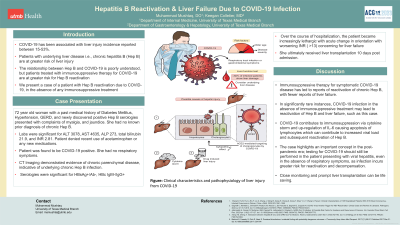Sunday Poster Session
Category: Liver
P1005 - Hepatitis B Reactivation & Liver Failure Due to COVID-19 Infection
Sunday, October 22, 2023
3:30 PM - 7:00 PM PT
Location: Exhibit Hall

Has Audio

Muhammad Mushtaq, DO
University of Texas Medical Branch-Galveston
Galveston, TX
Presenting Author(s)
Award: Presidential Poster Award
Muhammad Mushtaq, DO1, Keegan Colletier, MD2
1University of Texas Medical Branch-Galveston, Galveston, TX; 2UTMB Galveston, Texas City, TX
Introduction: COVID-19 has been associated with liver injury incidence reported between 15-53%. Viral binding to ACE2 receptors in hepato-biliary cells is thought to mediate liver inflammation. Patients with underlying liver disease i.e., chronic hepatitis B (Hep B) are at greater risk of liver injury. The relationship between Hep B and COVID-19 is poorly understood, but patients treated with immunosuppressive therapy for COVID-19 are at greater risk for Hep B reactivation. We hereby present a case of a patient with Hep B reactivation due to COVID-19, in the absence of any immunosuppressive treatment, leading to fulminant liver failure and subsequent liver transplantation.
Case Description/Methods: A 72 year old woman with a past medical history of Diabetes Mellitus, Hypertension, GERD, and newly discovered positive Hep B serologies a few days prior to admission presented with complaints of myalgia, and jaundice. She had no known prior diagnosis of chronic Hep B. She had no respiratory symptoms. Labs were significant for ALT 3078, AST 4635, ALP 273, total bilirubin 21.9, and INR 2.81. Patient denied recent use of acetaminophen or any new medications. Patient was found to be COVID-19 positive. CT Imaging demonstrated evidence of chronic parenchymal disease, indicative of underlying chronic Hep B infection. Serologies were significant for HBsAg+/Ab-, HBc IgM-/IgG+. Over the course of hospitalization, the patient became increasingly lethargic with acute change in orientation with worsening INR ( >13) concerning for liver failure. She ultimately received liver transplantation 10 days post admission.
Discussion: Immunosuppressive therapy for symptomatic COVID-19 disease has led to reports of reactivation of chronic Hep B, with fewer reports of liver failure. In significantly rare instances, COVID-19 infection in the absence of immunosuppressive treatment may lead to reactivation of Hep B and liver failure, such as this case. COVID-19 contributes to immunosuppression via cytokine storm and up-regulation of IL-6 causing apoptosis of lymphocytes which can contribute to increased viral load and subsequent reactivation of Hep B. The case highlights an important concept in the post-pandemic era; testing for COVID-19 should still be performed in the patient presenting with viral hepatitis, even in the absence of respiratory symptoms, as infection incurs greater risk for reactivation and decompensation. Close monitoring and prompt liver transplantation can be life saving.
Disclosures:
Muhammad Mushtaq, DO1, Keegan Colletier, MD2. P1005 - Hepatitis B Reactivation & Liver Failure Due to COVID-19 Infection, ACG 2023 Annual Scientific Meeting Abstracts. Vancouver, BC, Canada: American College of Gastroenterology.
Muhammad Mushtaq, DO1, Keegan Colletier, MD2
1University of Texas Medical Branch-Galveston, Galveston, TX; 2UTMB Galveston, Texas City, TX
Introduction: COVID-19 has been associated with liver injury incidence reported between 15-53%. Viral binding to ACE2 receptors in hepato-biliary cells is thought to mediate liver inflammation. Patients with underlying liver disease i.e., chronic hepatitis B (Hep B) are at greater risk of liver injury. The relationship between Hep B and COVID-19 is poorly understood, but patients treated with immunosuppressive therapy for COVID-19 are at greater risk for Hep B reactivation. We hereby present a case of a patient with Hep B reactivation due to COVID-19, in the absence of any immunosuppressive treatment, leading to fulminant liver failure and subsequent liver transplantation.
Case Description/Methods: A 72 year old woman with a past medical history of Diabetes Mellitus, Hypertension, GERD, and newly discovered positive Hep B serologies a few days prior to admission presented with complaints of myalgia, and jaundice. She had no known prior diagnosis of chronic Hep B. She had no respiratory symptoms. Labs were significant for ALT 3078, AST 4635, ALP 273, total bilirubin 21.9, and INR 2.81. Patient denied recent use of acetaminophen or any new medications. Patient was found to be COVID-19 positive. CT Imaging demonstrated evidence of chronic parenchymal disease, indicative of underlying chronic Hep B infection. Serologies were significant for HBsAg+/Ab-, HBc IgM-/IgG+. Over the course of hospitalization, the patient became increasingly lethargic with acute change in orientation with worsening INR ( >13) concerning for liver failure. She ultimately received liver transplantation 10 days post admission.
Discussion: Immunosuppressive therapy for symptomatic COVID-19 disease has led to reports of reactivation of chronic Hep B, with fewer reports of liver failure. In significantly rare instances, COVID-19 infection in the absence of immunosuppressive treatment may lead to reactivation of Hep B and liver failure, such as this case. COVID-19 contributes to immunosuppression via cytokine storm and up-regulation of IL-6 causing apoptosis of lymphocytes which can contribute to increased viral load and subsequent reactivation of Hep B. The case highlights an important concept in the post-pandemic era; testing for COVID-19 should still be performed in the patient presenting with viral hepatitis, even in the absence of respiratory symptoms, as infection incurs greater risk for reactivation and decompensation. Close monitoring and prompt liver transplantation can be life saving.
Disclosures:
Muhammad Mushtaq indicated no relevant financial relationships.
Keegan Colletier indicated no relevant financial relationships.
Muhammad Mushtaq, DO1, Keegan Colletier, MD2. P1005 - Hepatitis B Reactivation & Liver Failure Due to COVID-19 Infection, ACG 2023 Annual Scientific Meeting Abstracts. Vancouver, BC, Canada: American College of Gastroenterology.

